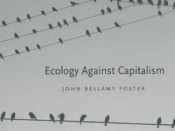“Imperial America and War,” Monthly Review vol. 55, no. 1 (May 2003), pp. 1-10. DOI: http://dx.doi.org/10.14452/MR-055-01-2003-05_1
On November 11, 2000, Richard Haass—a member of the National Security Council and special assistant to the president under the elder Bush, soon to be appointed director of policy planning in the State Department of newly elected President George W. Bush—delivered a paper in Atlanta entitled “Imperial America.” For the United States to succeed at its objective of global preeminence, he declared, it would be necessary for Americans to “re-conceive their role from a traditional nation-state to an imperial power.” Haass eschewed the term “imperialist” in describing America’s role, preferring “imperial,” since the former connoted “exploitation, normally for commercial ends,” and “territorial control.”
Reprints:
- Reprinted in Pratyush Chandra, Anuradha Ghosh and Ravi Kumar, The Politics of Imperialism and Counterstrategies. Delhi: Aakar Books, 2004, pp. 25-36.
Translations:
- French translation published in À L’ Encontre, no.12 (2003), pp. 35-39;
- Spanish translation published in Monthly Review—Selecciones en castellano, no. 1 (May 2004).
- Russian translation on www.left.ru.
- German translation in AG Friedenforschung, http://www.unikassel.de/fb5/frieden/regionen/USA/foster.html.

